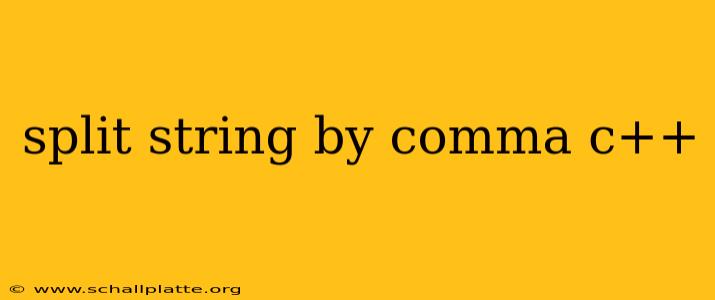Splitting Strings by Comma in C++: Several Approaches
Splitting a string by a delimiter, such as a comma, is a common task in C++ programming. This operation is crucial for parsing data from files, processing user input, or handling data from various sources. This article explores several methods for achieving this, ranging from simple approaches to more robust and efficient techniques.
Method 1: Using std::stringstream (Recommended for Simplicity)
The std::stringstream class provides a straightforward way to split a string. It allows you to treat a string as a stream, making it easy to extract substrings delimited by a specific character.
#include <iostream>
#include <sstream>
#include <string>
#include <vector>
std::vector<std::string> splitString(const std::string& str, char delimiter) {
std::vector<std::string> result;
std::stringstream ss(str);
std::string item;
while (std::getline(ss, item, delimiter)) {
result.push_back(item);
}
return result;
}
int main() {
std::string inputString = "apple,banana,cherry,date";
std::vector<std::string> splitStrings = splitString(inputString, ',');
for (const std::string& str : splitStrings) {
std::cout << str << std::endl;
}
return 0;
}
This code first creates a std::stringstream from the input string. The std::getline function then reads the string until it encounters the delimiter (a comma in this case), adding each substring to the result vector. This method is efficient and easy to understand.
Method 2: Using std::string::find and std::string::substr (More Control)
This method offers more granular control over the splitting process. It uses std::string::find to locate the delimiter and std::string::substr to extract the substrings.
#include <iostream>
#include <string>
#include <vector>
std::vector<std::string> splitString2(const std::string& str, char delimiter) {
std::vector<std::string> result;
size_t pos = 0;
size_t found;
while ((found = str.find(delimiter, pos)) != std::string::npos) {
result.push_back(str.substr(pos, found - pos));
pos = found + 1;
}
result.push_back(str.substr(pos)); // Add the last substring
return result;
}
int main() {
std::string inputString = "apple,banana,cherry,date";
std::vector<std::string> splitStrings = splitString2(inputString, ',');
for (const std::string& str : splitStrings) {
std::cout << str << std::endl;
}
return 0;
}
This code iteratively searches for the delimiter. When found, it extracts the substring using substr and adds it to the result vector. The last substring is handled separately after the loop.
Method 3: Handling Multiple Spaces and Empty Entries (Robustness)
The previous methods might not handle multiple consecutive delimiters or empty entries gracefully. A more robust solution involves trimming whitespace and handling empty strings:
#include <iostream>
#include <sstream>
#include <string>
#include <vector>
#include <algorithm>
//Helper function to trim whitespace
std::string trim(const std::string& str) {
size_t first = str.find_first_not_of(' ');
if (std::string::npos == first) {
return str;
}
size_t last = str.find_last_not_of(' ');
return str.substr(first, (last - first + 1));
}
std::vector<std::string> splitStringRobust(const std::string& str, char delimiter) {
std::vector<std::string> result;
std::stringstream ss(str);
std::string item;
while (std::getline(ss, item, delimiter)) {
std::string trimmed = trim(item); //Trim whitespace
if (!trimmed.empty()) { //Ignore empty entries
result.push_back(trimmed);
}
}
return result;
}
int main() {
std::string inputString = "apple, ,banana,cherry,,date ";
std::vector<std::string> splitStrings = splitStringRobust(inputString, ',');
for (const std::string& str : splitStrings) {
std::cout << str << std::endl;
}
return 0;
}
This enhanced version adds a trim function to remove leading/trailing whitespace and checks for empty strings before adding to the result.
Choosing the right method depends on your specific needs. For simple cases, std::stringstream offers a clean and concise solution. For more complex scenarios requiring fine-grained control or robustness, the other methods provide greater flexibility. Remember to include the necessary headers: <iostream>, <string>, <vector>, and <sstream>.
